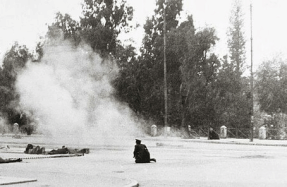FAR EAST COMMANDO PART II: COMMUNISTS, PRISONERS AND PARTITION
WORDS TOM GARNER



There were mass celebrations in Britain when Nazi Germany unconditionally surrendered on 8 May 1945. To many it was a huge sigh of relief that the war in Europe had ended after years of death and destruction on a scale that even dwarfed World War I. Nevertheless, World War II was not actually over, and the nightmarish conflict against Japan continued in the Far East for months afterwards. To British soldiers like Robert Callow, who were still vigorously fighting the Japanese, VE Day meant very little in what remained an extremely bloody war: “Churchill declared VE Day in Europe in May 1945 but we lost 4,000 men between May and August.”
At that point Callow had only just turned 20, but he was already an experienced explosives expert and polyglot who had been destroying Japanese bridges behind enemy lines in Burma between 1943-44. Callow was a Royal Engineer who fought as a commando in Force 136, Inter-Services Liaison Department but his initial Burmese experiences were only the beginning of an adventurous military career. Callow witnessed momentous events in China, Malaya and India by the end of the 1940s and met several giants of Asian history along the way.
Blowing up mountains
Now a captain, Callow left Burma a few months before VE Day and went into China with other members of Force 136. Their task was to assist Chinese forces and prevent the retreating Japanese army from escaping from Burma through the country. In preparation for this, Callow detonated a large explosion in September 1944 near Lashio. “When the Japanese were trying to get out back into China towards the end of the war I blew up and brought down a mountainside on a convoy of five lorries driven by Koreans.”
Although Lashio sat in Burma, it had a significant Chinese population, and the mountain was strategically positioned over a road towards China. Callow and his men worked with the local population. “We used the local Chinese with their packhorses to carry the bulk of the slow explosives and fill the top caves with them. The road was
You’re reading a preview, subscribe to read more.
Start your free 30 days





